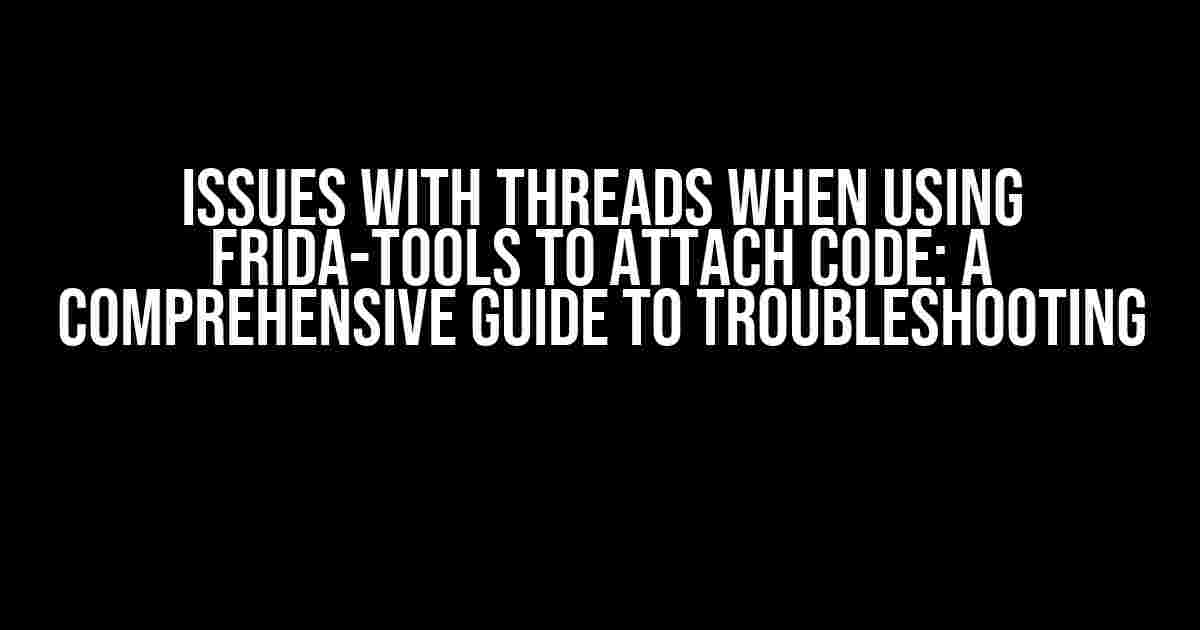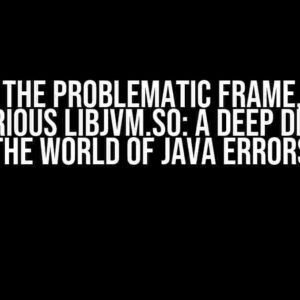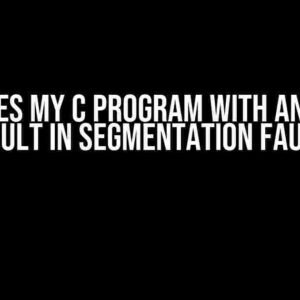Frida-tools is an incredible framework for dynamic instrumentation, allowing developers to attach code to running processes, manipulate internal logic, and uncover hidden secrets. However, when working with threads, things can get messy. In this article, we’ll delve into the common issues you might encounter when using Frida-tools to attach code, and provide you with expert guidance on how to troubleshoot and overcome these problems.
Understanding the Basics of Frida-Tools and Threads
Before we dive into the issues, let’s quickly review the fundamentals of Frida-tools and threads. Frida-tools allows you to attach scripts to running processes, enabling you to analyze, modify, and inspect the internal workings of an application. Threads, on the other hand, are lightweight processes that operate within a single process, enabling concurrency and improving system responsiveness.
In the context of Frida-tools, threads become crucial when attaching code to a running process. You need to understand how to manage threads effectively to avoid issues and ensure seamless instrumentation.
Issue 1: Thread Safety and Synchronization
One of the most common issues with threads when using Frida-tools is ensuring thread safety and synchronization. When attaching code to a running process, you need to ensure that your script is thread-safe, meaning it can execute concurrently without causing issues or crashes.
To overcome this issue, follow these best practices:
Use thread-local storageto store data specific to each thread, avoiding global variables that can be accessed by multiple threads.- Employ
mutexes and locksto synchronize access to shared resources, preventing data corruption and race conditions. - Implement
thread-safe loggingto avoid log message interleaving and ensure consistent output.
// Example of using a mutex to synchronize access to a shared resource
var mutex = new Frida.Mutex();
var sharedData = [];
function threadSafeFunction() {
mutex.lock();
try {
// Access and modify sharedData safely
} finally {
mutex.unlock();
}
}
Issue 2: Thread Context and AttachPoints
Another issue you might encounter is managing thread context and attach points. When attaching code to a running process, you need to specify the correct attach point and context for each thread.
To resolve this issue, follow these guidelines:
Identify the correct attach pointfor each thread, using Frida’senumerateThreads()method to retrieve a list of threads and their corresponding IDs.Set the correct thread contextusing Frida’ssetThreadContext()method, ensuring that your script executes in the desired thread.
// Example of setting the correct thread context var threads = Frida.enumerateThreads(pid); var targetThread = threads[0]; Frida.setThreadContext(targetThread.id);
Issue 3: Thread Starvation and Deadlocks
Thread starvation and deadlocks can occur when using Frida-tools, particularly when dealing with complex thread interactions. Thread starvation happens when a thread is unable to access a shared resource, while a deadlock occurs when two or more threads are blocked, waiting for each other to release a resource.
To avoid these issues, follow these best practices:
Avoid lengthy operationsthat can cause thread starvation, breaking down complex tasks into smaller, non-blocking chunks.Use timeout-based synchronizationto detect and recover from potential deadlocks, implementing timeout mechanisms to abort and retry operations.
// Example of using timeout-based synchronization
var timeout = 1000; // 1-second timeout
var lock = Frida.Lock(timeout);
try {
// Perform operation that might deadlock
} catch (e) {
if (e instanceof Frida.TimeoutError) {
console.log("Timeout occurred, retrying...");
// Retry operation
} else {
throw e;
}
}
Issue 4: Thread-Specific Data and Storage
When working with Frida-tools, you need to manage thread-specific data and storage effectively. Each thread has its own memory space, and accessing data from the wrong thread can lead to issues.
To overcome this issue, follow these guidelines:
Use thread-local storageto store data specific to each thread, avoiding global variables that can be accessed by multiple threads.Implement thread-aware cachingto store frequently accessed data in a thread-safe manner.
// Example of using thread-local storage
var threadData = {};
function getThreadData(key) {
var tid = Frida.ThreadId.current();
if (!threadData[tid]) {
threadData[tid] = {};
}
return threadData[tid][key];
}
function setThreadData(key, value) {
var tid = Frida.ThreadId.current();
if (!threadData[tid]) {
threadData[tid] = {};
}
threadData[tid][key] = value;
}
Issue 5: Instrumentation and Hooking
Instrumentation and hooking can become issues when using Frida-tools, particularly when dealing with complex thread interactions. Instrumentation involves inserting code into a running process, while hooking involves modifying existing code.
To resolve these issues, follow these guidelines:
Use Frida's built-in instrumentation APIs, such asintercept()andreplace(), to simplify instrumentation and hooking.Implement thread-aware instrumentationto ensure that instrumentation code is executed in the correct thread context.
// Example of using Frida's instrumentation API
Frida.intercept(Module.findExportByName(null, 'malloc'), {
onEnter: function(args) {
console.log('malloc() called');
},
onLeave: function(retval) {
console.log('malloc() returned ' + retval);
}
});
Conclusion
In this article, we’ve explored the common issues you might encounter when using Frida-tools to attach code to running processes, focusing on threads. By understanding the basics of Frida-tools and threads, and following the best practices outlined above, you can overcome these issues and successfully instrument and analyze complex applications.
Remember to manage thread safety and synchronization, handle thread context and attach points, avoid thread starvation and deadlocks, manage thread-specific data and storage, and implement effective instrumentation and hooking. With these strategies in place, you’ll be well-equipped to handle the challenges of dynamic instrumentation and uncover the secrets of the applications you’re analyzing.
| Issue | Description | Solution |
|---|---|---|
| Thread Safety and Synchronization | Ensuring thread safety and synchronization to avoid issues and crashes. | Use thread-local storage, mutexes, and locks to synchronize access to shared resources. |
| Thread Context and AttachPoints | Managing thread context and attach points to ensure correct script execution. | Identify correct attach points, set the correct thread context, and use Frida’s built-in APIs. |
| Thread Starvation and Deadlocks | Avoiding thread starvation and deadlocks to ensure efficient script execution. | Avoid lengthy operations, use timeout-based synchronization, and implement thread-aware caching. |
| Thread-Specific Data and Storage | Managing thread-specific data and storage to avoid data corruption. | Use thread-local storage and implement thread-aware caching to store data specific to each thread. |
| Instrumentation and Hooking | Implementing effective instrumentation and hooking to analyze complex applications. | Use Frida’s built-in instrumentation APIs, implement thread-aware instrumentation, and simplify hooking. |
By following these guidelines and understanding the intricacies of Frida-tools and threads, you’ll be well-equipped to overcome the challenges of dynamic instrumentation and unlock the secrets of the applications you’re analyzing.
Frequently Asked Question
Get answers to the most common issues when using Frida-tools to attach code to threads!
Why does Frida-tool always crash when I try to attach code to a thread?
This might be due to Frida’s limitations when dealing with threads. Make sure you’re using the correct API version and that your thread is not already attached to another Frida process. Try restarting Frida-tool or checking the thread’s status before attaching code.
I’m getting a “thread not found” error when trying to attach code. What’s going on?
Double-check that the thread ID you’re using is correct and that the thread is still active. You can use Frida’s `enumerate_threads()` function to get a list of all active threads and their IDs. Also, ensure that your Frida script is running in the correct process context.
Can I attach code to a thread that’s currently suspended or sleeping?
Unfortunately, no. Frida-tool can only attach code to running threads. If the thread is suspended or sleeping, you’ll need to wake it up or resume it before attaching code. Use Frida’s `resume()` function to resume a suspended thread.
How do I detach code from a thread once I’m done with it?
Use Frida’s `detach()` function to detach code from a thread. Make sure to detach code before the thread exits or is terminated, as this can cause issues with Frida’s internal state.
What happens if I attach code to a thread that’s already being executed by another Frida script?
Frida-tool will raise an error if you try to attach code to a thread that’s already being executed by another Frida script. To avoid this, use Frida’s `try_attach()` function, which will return an error code if the thread is already attached.




